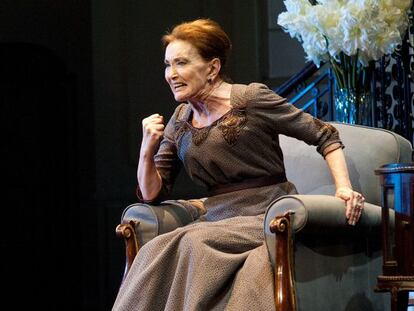Nuria Espert: stage by stage
Catalan actress' career has been marked by dedication and a love of taking risks

There is no other woman in Spanish theater with the experience, the love of risk, the dedication and the generosity of Nuria Espert. Over her long career, the 76-year-old has been an actress, director and impresario and now she is back treading the boards in Madrid at the María Guerrero Theater as Regina Giddens in the National Dramatic Center's production of Lillian Hellman's classic melodrama The Little Foxes.
"She is so brave and has such a clear emotional intelligence, that Nuria will make a fascinating Regina Giddens," says the production's director, Gerardo Vera. "With all the experience she has, she is still an incredibly contemporary actress. She has never ended up stuck in cliché; everything she does and says is perfectly recognizable and understandable."
Espert's career first took off at the age of 19 when she received a standing ovation at the Griego Theater in Barcelona for her role in a 1954 version of Medea. The production went on to tour the country.
"When I got back, with the money from that tour, my mother and I put in a telephone to answer the flood of calls offering great roles," she recalls. "The telephone didn't ring a single time for the whole following year: a first lesson learnt about the highs and lows of this blessed profession."
With all her experience as an actress, she is still so contemporary"
Espert's next key role came when she teamed up with the upcoming Argentinean director Víctor García for a version of Jean Genet's The Maids in 1969. The production had originally been part of a double bill with Fernando Arrabal's The Two Executioners, but that fell foul of the Francoist censors and the project was shelved. It was only after a state of emergency was declared in January 1969 and Marat-Sade author Peter Weiss pulled his production at Barcelona's Poliorama Theater in protest that The Maids stepped in and saw the light. And nobody went to see it. Later in the year, it traveled to the Belgrade festival, won the Grand Jury Prize and, once back in Barcelona, packed out the theater for months.
"The Maids was Víctor García's best show and the best I have ever done. Rounded, perfect, terribly risky. That production changed my career and my life," she says.
Espert teamed up again with García in 1971 for Federico García Lorca's Yerma, which established her reputation and sent her on a four-year international tour involving 2,000 performances in the United States, Russia, South America and Japan. For renowned British director Peter Brook, the show was a landmark in European theater. And, of course, things were never the same again in Spanish theater. "We could do it because in the 1960s [actress] Aurora Bautista had done it with [director] Luis Escobar," she remembers. "But, of course, the censors were not expecting that explosion of the senses, that pagan ceremony of sex and death that Víctor turned it into." It premiered at the Comedia Theater in November 1971 amid a massive police presence that surrounded the theater two hours before the doors opened.
Espert would return to Lorca in 1985 for her directorial debut with an English-language production, no less, of The House of Bernarda Alba at the Lyric Theatre in Hammersmith, London. The play starred Glenda Jackson as Bernarda and Joan Plowright as Poncia and won the Olivier Award for best play of the year. After three months, it transferred to the Gielgud Theatre in the West End with The Guardian theater critic Michael Billington writing that: "Nuria Espert has, bit by bit, opened the doors of the British stage to Lorca."
'The Guardian' said she had "opened the doors of the British stage to Lorca"
Five years later, in 1990, she performed Maquillaje, a monologue by Hisashi Inoue about an old actress about to make her last performance, which she discovered in Japan at the end of the 1980s. "It was the first time that I did a monologue," she says, "and that hour-and-a-half on stage turned out to be exhausting." But against all expectations, audiences loved it and she performed it across Spain. "I would prefer to do 20 Medeas than do Maquillaje again, but it was worth the effort."
In 2010, she starred in another one-woman show when she played all the parts in Miguel del Arco's version of Shakespeare's intense narrative poem The Rape of Lucrece, which she also took around Spain. The actress caught all the nuances of José Luis Rivas' splendid translation as if they were birds before letting them fly again: the villainy, doubt, ferocity and desperation of Tarquin; the innocence, the unbearable pain and ultimate strength of Lucrece. The show was a culmination and a summing up: in her voice, in her look, in her gestures, we see the sharpening of her whole career and each of her tragic heroines.
Tu suscripción se está usando en otro dispositivo
¿Quieres añadir otro usuario a tu suscripción?
Si continúas leyendo en este dispositivo, no se podrá leer en el otro.
FlechaTu suscripción se está usando en otro dispositivo y solo puedes acceder a EL PAÍS desde un dispositivo a la vez.
Si quieres compartir tu cuenta, cambia tu suscripción a la modalidad Premium, así podrás añadir otro usuario. Cada uno accederá con su propia cuenta de email, lo que os permitirá personalizar vuestra experiencia en EL PAÍS.
¿Tienes una suscripción de empresa? Accede aquí para contratar más cuentas.
En el caso de no saber quién está usando tu cuenta, te recomendamos cambiar tu contraseña aquí.
Si decides continuar compartiendo tu cuenta, este mensaje se mostrará en tu dispositivo y en el de la otra persona que está usando tu cuenta de forma indefinida, afectando a tu experiencia de lectura. Puedes consultar aquí los términos y condiciones de la suscripción digital.








































